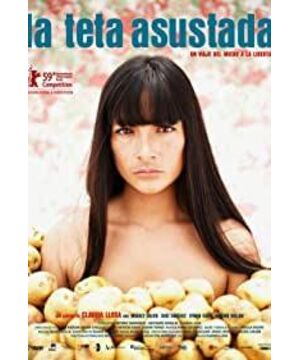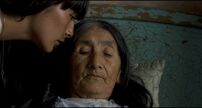Fasta is undoubtedly a tragedy. Her tragedy is not only in her mother, not only in her mother's experience and her mother's teachings from childhood. In the beginning, the mother's song is brutal and bloody about being raped. They were not satisfied, they shoved my dead husband's genitals into my mouth. Mother looked over sixty years old, and the catastrophe was still vivid even twenty years later. The mother kept telling her how sinister the outside world was and asked her daughter to sing such songs without eating. This is much like those single mothers who have been hurt by love have repeatedly warned their daughters to stay away from men. However, the story is much more tragic.
I thought her misfortune came from childhood, from family, from environment, from that dirty history. But Fasta said that while I was still in my mother's womb, I felt her tear. I watched her get raped. Only now did I know the true meaning of sad milk, or desperate breasts. This is the sadness that goes deep into the soul, far deeper than the shadow of childhood. That's why we see her so lifeless. It's a uterine threat so ingrained and powerful that it affects genes. It's heredity and fate. Pregnant mother felt tear when rapist raped her. Despair and fear have since become ingrained. That was the real threat she felt in the womb.
Therefore, she chose a rather tragic way to protect herself. Stuff the vagina with a potato. Mother told a story of how a neighbor was spared rape in times of terror.
Her awakening point was in female employers and gardeners. The gardener gave her the respect and love of the opposite sex. The female employer lured her to sing with beautiful pearls. At first, she was very secretive and did not dare to speak, because her mother's songs were all about the tragic rape, and her life was surrounded by fear. She didn't want to sing such tragic songs like her mother did. , and unable to feel beauty. Slowly, in contact with the gardener again and again, she has a feeling of beauty, she sings again and again, and is released, her heart is opened to this world, and she will sing many things in life into ballads.
She realizes the meaning of herself, instead of indulging in fear all day long, panicking. This is her awakening and release. The turning point was the employer concert. The employer, a thief, stole the melody of her ballad and made a sad piano piece, which was greatly praised. She heard the familiar melody and remembered the fears she once had, but she came out quickly, and congratulated her employer, saying that people would definitely like it. What she didn't know was that it was just a wolf in sheep's clothing. When the female employer asked for her, she lured her to speak with a good voice of pearls. Once the heroine's consciousness is awakened, it is no longer only slavery. Employers feel threatened.
The employer was kicking her out of the car and letting her go back on her own. Fasta yells, where is my pearl. The employer gave her value and hope, and hurt her badly. Even the pearls she won by song after song are no longer worthy of her own.
The Fasta at this time is the Fasta after the awakening. She has learned to resist. She went to the employer's bedroom, picked up the pearls under the bed one by one and held them tightly. She felt that it was hers and that she deserved it. That's why the heroine decides to take out the potato later, because she decides to no longer suffer from the fear and persecution of the past, she is a complete person who deserves and deserves her own life. The heroine's uncle came to cover the heroine's mouth at the wedding night, and the heroine struggled to escape. Uncle said, look at you trying so hard to live, but you don't dare to breathe. Don't go, Fasta. This part is quite inexplicable, because my uncle doesn't care so much about the heroine, and he is quite stingy. At first I thought he was going to rape her.
Later I understood. The uncle thought that the heroine was suffering from a desperate breast disease. Seeing the heroine's appearance all day long, he was worried. My sister left in desperation. He was afraid that her niece would have the same fate as her sister. This is the only way to make the heroine struggle desperately to tell her, look, how much you want to live, but why don't you dare to breathe, live well, resist, you have to be in fear all the time?
There is a bit of the meaning of forcing young eagles to learn to fly on the cliff. I thought that my uncle was so introverted and a bit buckled, but it turned out to be a true philosopher in the audience. The ending is also touching. Fasta carried her mother on her back, just like her mother held her baby back then. Bury her mother back to the village, take her to see the sea, and reunite her with her father.
Life, in the end, the roles have changed. I am small you hold me. You are old, like a little child who knows nothing, until I hold you. A cruel cycle of fate. Why is the sky falling? Why do parents get old? Why? Fate dictates that we have to accept loss? At the end, the gardener performed the operation on the back of the heroine, and gave her a pot of flowers, with potatoes in the soil as fertilizer. Potatoes, which originally represented dirty and sinful things, can also be turned into fertilizers and take care of the growth of a delicate flower. The implication is that the heroine is the flower that blooms in sin.
I hope that in 2022, everyone who is struggling in the mud will be able to see the starry sky, and will be able to bloom a delicate flower.
View more about La teta asustada reviews










